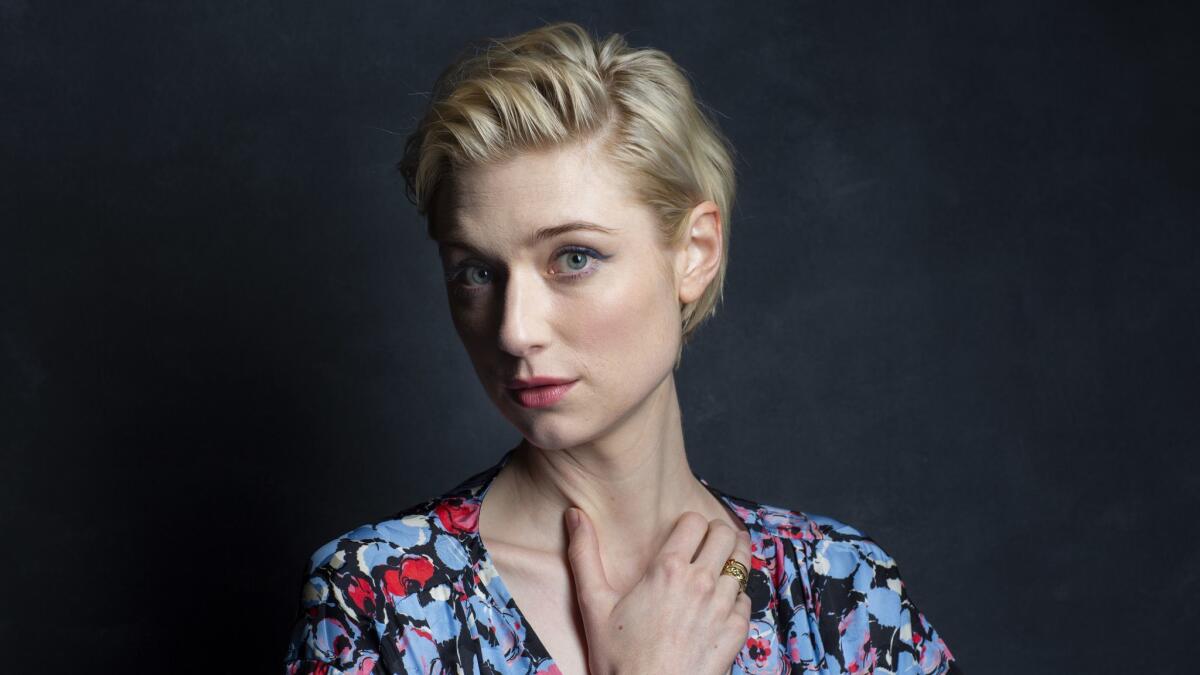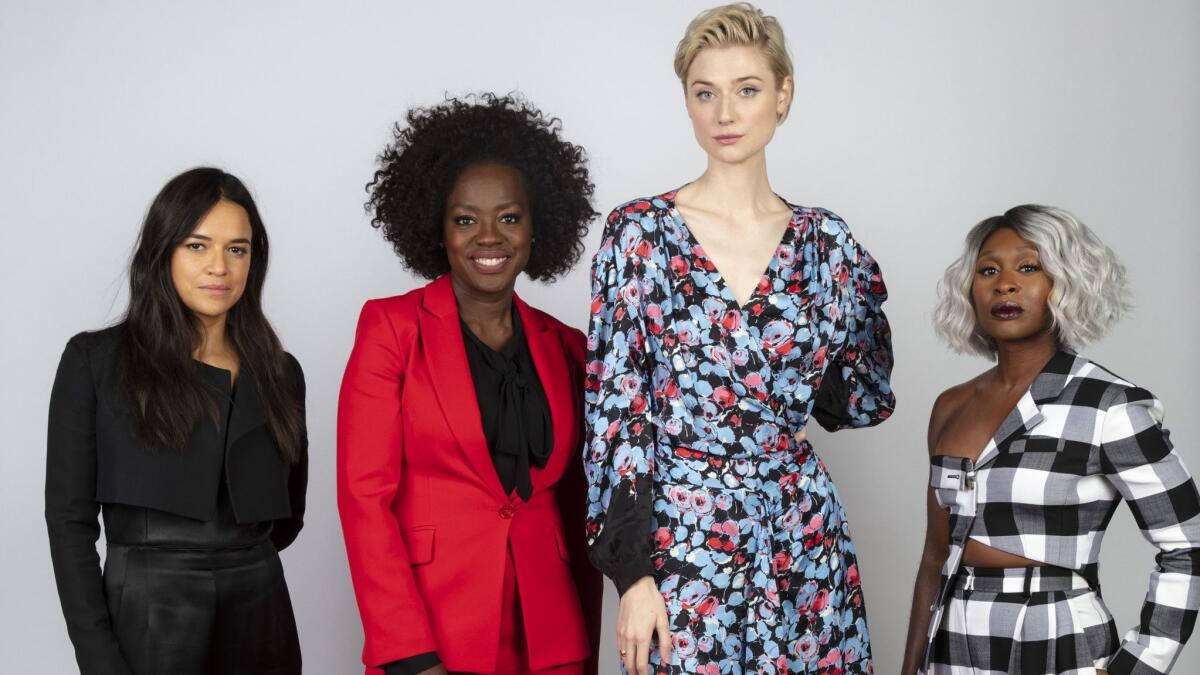In the crowded cast of ‘Widows,’ Elizabeth Debicki is a standout

The heist thriller “Widows” has arguably the most impressively stacked ensemble cast of the year, including Viola Davis, Liam Neeson, Daniel Kaluuya, Michelle Rodriguez, Brian Tyree Henry, Carrie Coon, Robert Duvall, Jacki Weaver, Colin Farrell and Cynthia Erivo.
Which makes it all the more impressive that 28-year-old Australian actress Elizabeth Debicki has been singled out for her performance as Alice, a young woman who gets out from under the repression of her abusive husband and her exploitative mother to discover she has more to offer than anyone, including herself, had previously known.
“She resonated on many, many levels,” Debicki said of the part during a recent interview in Los Angeles. “I mean, I’ve been looking and waiting for some time to play somebody like Alice, somebody who was very real and raw and multidimensional, had an arc that was quite an amazing sort of growth in that woman’s life. So there was me as the actor looking at it and thinking, ‘I just want to get my hands on that.’”
In the movie Davis plays Veronica, a woman who is suddenly in debt to a dangerous gangster when her husband, a career criminal, dies during a robbery. Desperate, she hatches a plan to commit what her husband had planned as his next job and recruits the other widows from his former crew — played by Debicki, Rodriguez and Erivo — to take on an audacious act of armed larceny.
“Widows” is directed by Oscar-winning filmmaker Steve McQueen (“12 Years a Slave”), who co-wrote the screenplay with “Gone Girl” and “Sharp Objects” author Gillian Flynn. Much of the movie is the four women planning how to execute the heist, and Debicki recalled how exciting it was for the four actresses.
“It’s so interesting how charged the energy was around us four. It was really remarkable, and I’ve never experienced anything like that,” Debicki said. “I don’t think anything with Steve is down to chance. He knew the chemistry that he was cooking up when he put the four of us together.
“And how much art mirrored life mirrored art in the making of this film is kind of remarkable,” she added. “Because you have four women who are so different from one another; we could not be further removed from one another in where we come from, who we are, our ages, how we look, our life experiences, our experiences as actresses. Yet when we got together, the space that Steve opened up as a director was one of, we didn’t have time to be anything but honest.”

Debicki has been having a breakout year. She was in “The Tale,” which premiered at Sundance and has gone on to nominations at the Emmys, the Gotham Awards and the Spirit Awards. “Breathe,” directed by Simon Baker, earned Debicki a supporting actress nomination from the Australian Academy of Cinema and Television Arts.
She appeared in “The Cloverfield Paradox” and as a voice actor in “Peter Rabbit.” When “Widows” premiered at the Toronto International Film Festival she was also there with “Vita and Virginia,” in which she played Virginia Woolf.
Debicki first came to the attention of American audiences with her role as Jordan Baker in Baz Luhrmann’s 2013 adaptation of “The Great Gatsby.” She appeared onstage with Cate Blanchett and Isabelle Huppert in a production of Jean Genet’s “The Maids” in Sydney and New York. She also appeared as an international villainess in Guy Ritchie’s 2015 “The Man From U.N.C.L.E.” Then she received acclaim for her role in the 2016 miniseries “The Night Manager.”
It might be easy to draw comparisons between Debicki’s role in “Widows,” as a woman coming into her own, and her part in “The Night Manager,” in which she played a kept woman striving for independence.
“I didn’t really think of it like that, but of course we can draw parallels,” Debicki said. “They’re both women who don’t have a source of independent income, which is incredibly disempowering. And when I think of both of those roles for me, they were maybe the most pivotal roles I’ve played as an actress because they challenged me; they are very, very far from what I am, me personally. And I felt like there was a great amount of truth, and I also felt a great deal of responsibility to bring nuance to it.”
Director Susanne Bier, who won an Emmy for her work on “The Night Manager,” recalled what led her to cast Debicki.
“There was a danger with that character that it could have been the classical sort of eye candy,” Bier said. “Not to say Elizabeth is not eye candy, but she’s not a cliché, and I really wanted to avoid the cliché of a gangster’s hot girlfriend. She’s like an amazing, astounding beauty, but she’s not your standard hot blond, trophy girlfriend. She’s just very different. She adds so much depth to everything she does.”
In “The Tale,” Debicki played a character drawn from writer-director Jennifer Fox’s own experience as the woman who helped groom her for sexual abuse as a teenager. Although the two had spoken extensively, Fox didn’t actually meet Debicki in person until she arrived on set during production.
“She just got her,” said Fox of Debicki’s performance. “She knew what was right for her character. I remember one moment where I wanted her to smile and she almost refused. And maybe she gives me like a turn of the corner of her mouth. And when I saw it on the screen in the edit, I thought, ‘No, Elizabeth was right,’ every single time.”
McQueen recalled a specific moment during a scene in “Widows” where the four women are in a warehouse preparing for the heist. Davis’ character has had them place dirt into small plastic containers to replicate the weight of the cash they will be hauling off and how much they can carry in different denominations.
“Elizabeth picks up the Tupperware, looks at it and shakes it and feels the weight of it,” McQueen said. “And it reminds me so much of someone like Steve McQueen in ‘The Magnificent Seven,’ when he’s got the scatter gun and he rattles it before he loads the gun. I mean, it’s just gold. No, I never said to her to do that.
“She picked up that Tupperware box and felt the weight of it and then put it back,” he said. “It’s kind of minuscule, but that’s what the audience is doing anyway. And she’s doing it for them. You can’t buy that. You can’t teach that. You just have to have it.”
SIGN UP for the free Indie Focus movies newsletter »
Follow on Twitter: @IndieFocus
More to Read
Only good movies
Get the Indie Focus newsletter, Mark Olsen's weekly guide to the world of cinema.
You may occasionally receive promotional content from the Los Angeles Times.










